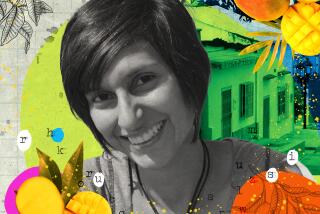Caribbean Collage : GREEN CANE AND JUICY FLOTSAML: Short Stories by Caribbean Women, <i> Edited by Carmen C. Esteves and Lizabeth Paravisini-Gebert (Rutger’s University Press: $34, cloth; $11.95, paper; 273 pp.)</i>
- Share via
Women writers in the Caribbean Third World have the multiple obstacles not only of gender but of racism, colonialism, poverty, illiteracy, the imposition of Western religion, and the seemingly unshakable power of patriarchal institutions. It is from this complex fabric, this green cane curtain, that the women of the Caribbean have endured their mute generations.
This volume of 27 wildly disparate stories seeks not only to address this enforced silence but to make a statement about identity found at a brutal cost and forced into form, even if only temporarily. This is an eclectic assortment of short fictions, written in English or translated from the Dutch, Spanish and French.
They originate in Trinidad and Jamaica, Puerto Rico and Cuba, the Dominican Republic, Haiti, Martinique, Guadeloupe, Surinam and Antigua. Their authors are as internationally known as Michelle Cliff, Jean Rhys and Jamaica Kincaid, or virtually unknown and never before available. And the stories they have produced are often stylistically unsettling, daring, bold to the point of deliberate sabotage, jarring and abrupt.
Here the folk tale, threads of oral tradition, verses from “The Arabian Nights,” the Bible, the disco jukebox and clearly recognizable current political issues meet and mate. There are the fantastic lyrical juxtapositions of magical realism with the hard edge of standard parody. There is a fragmentary sense that these stories are not so much a potpourri as they are a puzzle of a collage slowly emerging from the mist of dream and the glaze across the jungle, under a riot of bougainvillea and orchids, of moonlight blazing across the petals of poinsettias and luminous geraniums, on nights of ripening mangoes, plantains and sudden domestic violence.
Of particular fascination is Cuban novelist and short-story writer Dora Alonso’s “Cotton Candy,” a tale of sexual obsession in which “butterflies were falling under the green whip, dying, astonished, and young Lola was gathering her fragile harvest to offer to her first love.” Sometimes she walked hearing “the buzzing of the feverish beehives where she burned among the honey and the gyrations, wanting to sink her teeth into the sweetness full of stings.” As an old woman, she finds the “inexpressible, contagious atmosphere . . . where the beasts became beautiful like the trees and the light.”
Dominican-born Angela Hernandez’s exquisite story, “How to Gather the Shadows of the Flowers,” is a stylistically beautiful blend of poetry and psychology. A woman finds love in a personal and completely inhabited darkness of her own devising, where there are “violets and poppies growing deliriously, fennel and sunflowers and red-wine-colored hollyhocks like open umbrellas.” Here, “his laughter soars to the sky like bubbles of music coming out of a flute. I feel like sucking his mouth, I feel like eating him with lettuce and carnations. His teeth look moist.” Finally, after asking repeatedly what is reality, our protagonist finds the solution: “Now I know how to irrigate a garden that won’t stop growing, how to gather the shadows of the flowers, how to prevent their concealing the sun, and how to walk diagonally across the instants.”
In these pages, the reader encounters a world of women without men, women who dig subsistence gardens for their children, wait for the fishing boats and embroider in solitude, or fly off to Miami or New York or Paris to become domestics in a land of granite and strangers where it snows and they do not know the language.
There are acts of sacrifice and courage, but that is merely a literal interpretation of the stories. They are, more accurately, about hallucination and mirage, multiple ocean crossings, exiles within exile, and how identity is accidentally created in an unexpected confluence of fate and will. This Caribbean is a region of amulets, of offering white rum to the gods, home remedies of herbs and potions and if that doesn’t work, a priest or a psychiatrist. It is, despite the contradictions, somehow a pragmatic world.
If these stories seem at first a green cacophony, it is because they are, in point of fact, quite different from what we know as American short stories, different in their intensity and morphology and purpose. The Angst , the absolute acceptance of bourgeois parameters of thought and behavior that anchor our fiction, are absent here. Gone is the malaise, the petty, abstract internal bickering, the cynicism, and emotional insulation.
While these 27 stories speak in many languages, at their best they speak with one mouth. And what they are saying is that something real is at stake here.
There is a cumulative power to this volume, to these tales of migration, and the hunger for food, love, knowledge and power. Ultimately, these are stories about the struggle for transformation and what is most memorable and haunting, the sense of women daring to reveal themselves as passionate and vulnerable in the act of giving birth.
More to Read
Sign up for our Book Club newsletter
Get the latest news, events and more from the Los Angeles Times Book Club, and help us get L.A. reading and talking.
You may occasionally receive promotional content from the Los Angeles Times.






